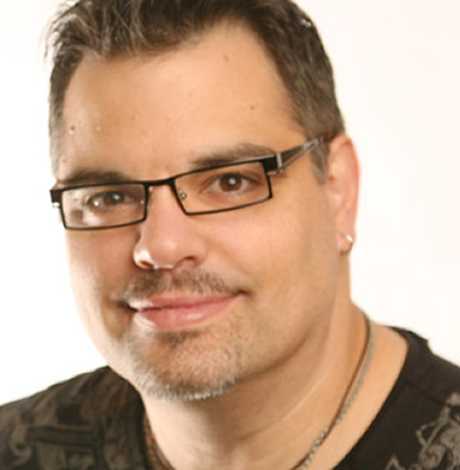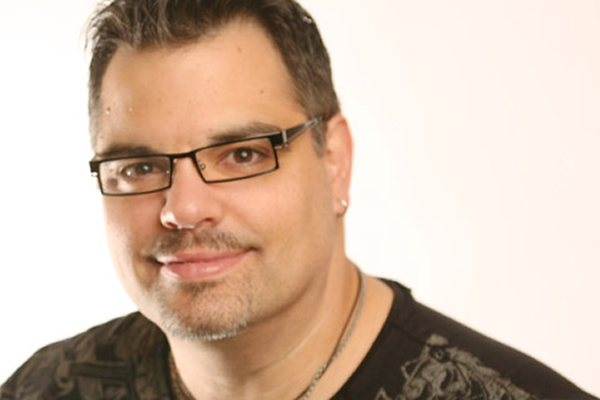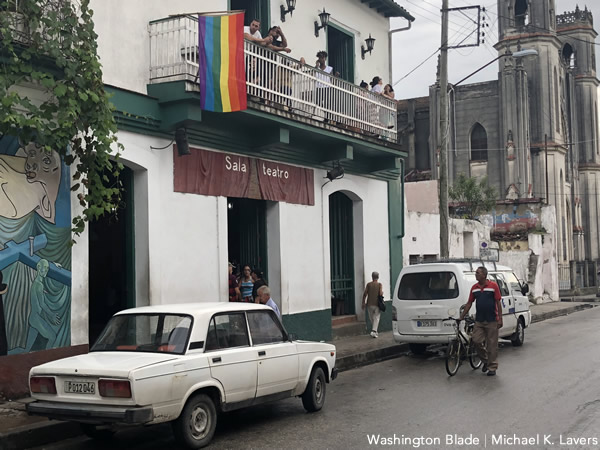News
Nuevo programa de radio estadounidense enfoca en temas LGBT en Cuba
Joe Cardona es presentador de ‘Arcoíris’ en Radio Martí


Joe Cardona es el presentador de “Arcoíris,” un nuevo programa en Radio Martí con un enfoque en los temas LGBT en Cuba. (Foto cortesía de Joe Cardona)
“Arcoíris” se transmitó por primera vez en Radio Martí el 28 de julio.
El programa se transmite cada sábado y domingo entre las 4-5 pm. Joe Cardona, un cineasta cubanoamericano y aliado que dirigió “The Day It Snowed in Miami,” un documental sobre la campaña de Anita Bryant en contra de la ordenanza de derechos gay del Condado Dade en 1977, presenta “Arcoíris.”
Nelson Gandulla Díaz, fundador de la Fundación Cubana por los Derechos LGBTI, un grupo LGBT independiente, apareció en “Arcoíris” el 25 de agosto. Gandulla, un fuerte crítico de Mariela Castro, la hija del expresidente cubano Raúl Castro que promueve los temas LGBT en Cuba como directora del Centro Nacional de Educación Sexual (CENESEX), habló con Cardona desde España donde ha pedido asilo.
“Arcoíris” el 1 de septiembre enfocó las experiencias de prisioneros gay en Cuba. Ignacio Estrada Cepero, fundador de la Liga Cubana contra la SIDA que ahora vive en Miami con su esposa, Wendy Iriepa Díaz, una mujer trans que una vez trabajó para CENESEX, también ha aparecido en el programa.
La familia de Cardona es originaria de La Habana y la Provincia de Matanzas. El dijo al Washington Blade el pasado mes durante una entrevista telefónica desde Miami que su programa “todo es de llevar los temas LGBT al público en Cuba.”
Activistas LGBT cubanoamericanos en el sur de Florida han aplaudido el programa.
“Arcoíris” es una ventaja importante al mundo alrededor para la comunidad LGBTQ cubana,” dijo Tony Lima, director ejecutivo de SAVE, en un comunicado de prensa de Radio Martí.
Presentador del programa ‘mira más allá’ de Mariela Castro
“Arcoíris” debutó casi tres meses después del presidente cubano Miguel Díaz-Canel tomó posesión del cargo. También empezó transmitirse contra el contexto del debate sobre la nueva constitución del país con una enmienda que extendería los derechos matrimoniales a parejas del mismo sexo.
Se están realizando ahora una serie de consultas públicas que permiten al público de comentar sobre la nueva constitución. Se espera que la Asamblea Nacional a finales de este año la finalice antes de un referéndum en febrero de 2019.
El debate, que incluye oposición pública de iglesias evangélicas, se está realizando menos de 60 años después del encarcelamiento de hombres gay en campos de trabajo — las UMAPs — después de la revolución cubana que llevó al poder Fidel Castro, el tío de Mariela Castro.
Partidarios de Mariela Castro, entre otras cosas, notan que Cuba ahora ofrece cirugías de reasignación de sexo gratuitas por su sistema nacional de salud. Gandulla y otros activistas LGBT independientes en Cuba dicen que confrontan el maltrato e incluso a la detención si critican públicamente a Mariela Castro, que es parlamentaria, o el gobierno cubano.
“Casi miro más allá de Mariela Castro,” Cardona dijo al Blade. “Miro a CENESEX como otro apparatchik del gobierno.”

El Mejunje es un centro cultural LGBT en Santa Clara, Cuba. Se realizó una marcha para conmemorar el Día Internacional contra la Homofobia, la Transfobia y la Bifobia en la ciudad el 15 de mayo de 2018. (Foto del Washington Blade por Michael K. Lavers)
Gobierno cubano es fuerte crítico de Radio Martí
Radio Martí empezo de transmitir a Cuba en 1985.
La Oficina de Transmisiones a Cuba en Miami, que es parte de la Agencia de Información Internacional de EEUU, funde Radio Martí y Televisión Martí. Los dos Martí tienen un presupuesto combinado de $28.1 millón.
El gobierno cubano ha criticado fuertemente Radio Martí y Televisión Martí.
El Miami New Times el pasado mes reportó que menos de 10 por ciento de cubanos escuchan a transmisiones de Radio Martí y menos de un por ciento de cubanos miran programas de Televisión Martí, en parte, porque el gobierno cubano ha podido bloquearlos para que no lleguen a la isla. Los críticos continúan instando al gobierno federal a que disminuya su financiamiento de Radio Martí y Televisión Martí.
Un acuerdo de 2014 entre el gobierno cubano y la administración de Obama para normalizar las relaciones diplomáticas entre La Habana y Washington incluyó acceso ampliado al internet en Cuba.
El presidente Trump el año pasado reimpuso restricciones de viaje y comercio con Cuba, aunque su empresa y varios de sus asociados han violado el bloqueo estadounidense contra la isla comunista. Acceso al internet en Cuba sigue limitado y costoso, aunque ahora hay más de 700 hotspots de WiFi públicos por todo el país y un programa piloto de la empresa estatal de telecomunicaciones de Cuba permite a los cubanos de tener conexiones de internet en sus hogares.
“No soy el tipo que prohíbe a nadie viajar allí,” Cardona dijo al Blade el viernes desde Miami. “Obviamente lo aliento, pero le digo a la gente, ve allí con los ojos abiertos.”
National
Supreme Court deals blow to trans student privacy protections
Under this ruling, parents are entitled to be informed about their children’s gender identity at school, regardless of state protections for student privacy.

The Supreme Court on Monday blocked a California policy that allowed teachers to withhold information about a student’s gender identity from their parents.
The policy had permitted California students to explore their gender identity at school without that information automatically being disclosed to their parents. Now, educators in the state will be required to inform parents about developments related to a student’s gender identity, depending on how the case proceeds in lower courts.
The case involves two sets of parents — identified in court filings as John and Jane Poe and John and Jane Doe — both of which say their daughters began identifying as boys at school without their knowledge, citing religious objections to gender transitioning.
The Poes say they only learned about their daughter’s gender dysphoria after she attempted suicide in eighth grade and was hospitalized. After treatment for the attempt and after being returned to school the following year, teachers continued using a male name and pronouns despite the parents’ objections, citing California law. The Poes have since placed their daughter in therapy and psychiatric care.
Similarly, the Does say their daughter has intermittently identified as a boy since fifth grade, but while their daughter was in seventh grade, they confronted school administrators over concerns that staff were using a male name and pronouns without informing them. The principal told them state law barred disclosure without the child’s consent.
Both sets of parents filed lawsuits in the U.S. District Court for the Southern District of California challenging the state policy that protects students’ gender identity and limits when schools can disclose that information to parents.
The justices voted along ideological lines, with the court’s six conservative members in the majority and the three liberal justices dissenting.
“We conclude that the parents who seek religious exemptions are likely to succeed on the merits of their Free Exercise Clause claim,” the court said in an unsigned order. “The parents who assert a free exercise claim have sincere religious beliefs about sex and gender, and they feel a religious obligation to raise their children in accordance with those beliefs. California’s policies violate those beliefs.”
In dissent, the three liberal justices argued that the case is still working its way through the lower courts and that there was no need for the high court to intervene at this stage. Justice Elena Kagan wrote, “If nothing else, this Court owes it to a sovereign State to avoid throwing over its policies in a slapdash way, if the Court can provide normal procedures. And throwing over a State’s policy is what the Court does today.”
Conservative Justices Samuel Alito and Clarence Thomas indicated they would have gone further and granted broader relief to the parents and teachers challenging the policy.
The emergency appeal from a group of teachers and parents in California followed a decision from the United States Court of Appeals for the Ninth Circuit that allowed the state’s policy to remain in effect. The appeals court had paused an order from U.S. District Judge Roger Benitez — who was nominated by George W. Bush — that sided with the parents and teachers and put the policy on hold.
The legal challenge was backed by the Thomas More Society, which relied heavily on a decision last year in which the court’s conservative majority sided with a group of religious parents seeking to opt their elementary school children out of engaging with LGBTQ-themed books in the classroom.
California Attorney General Rob Bonta expressed disappointment with the ruling. “We remain committed to ensuring a safe, welcoming school environment for all students while respecting the crucial role parents play in students’ lives,” his office said in a statement.
The decision comes as the Trump administration has taken a hardline approach to transgender rights. During his State of the Union address last week, President Donald Trump referenced Sage Blair, who previously identified as transgender and later detransitioned, describing Blair’s experience transitioning in a public school. According to the president, school employees supported Blair’s chosen gender identity and did not initially inform Blair’s parents.

Last year, the court upheld Tennessee’s ban on gender-affirming medical care for transgender minors and has allowed enforcement of a policy barring transgender people from serving in the military to continue during Trump’s second term.
District of Columbia
D.C. Black Pride theme, performers announced at ‘Speakeasy’
Durand Bernarr to headline 2026 programming

The Center for Black Equity held its 2026 DC Black Pride Theme Reveal event at Union Stage on Monday. The evening, a “Speakeasy Happy Hour,” was hosted by Anthony Oakes and featured performances by Lolita Leopard and Keith Angelo. The Center for Black Equity organizes DC Black Pride.
Kenya Hutton, Center for Black Equity president and CEO, spoke following the performances by Leopard and Angelo. Hutton announced this year’s theme for DC Black Pride: “New Black Renaissance.”
Performers for 2026 DC Black Pride were announced to be Bang Garcon, Be Steadwell, Jay Columbus, Bennu Byrd, Rue Pratt and Akeem Woods.
Singer-songwriter Durand Bernarr was announced as the headliner for the 2026 festivities. Bernerr gave brief remarks through a video played on the screen at the stage.
DC Black Pride is scheduled for May 22-25. For more information on DC Black Pride, visit dcblackpride.org.
Virginia
Arlington LGBTQ bar Freddie’s celebrates 25th anniversary
Owner asks public to support D.C.-area gay bars

An overflowing crowd turned out Sunday night, March 1, for the 25th anniversary celebration of Freddie’s Beach Bar, the LGBTQ bar and restaurant located in the Crystal City section of Arlington, Va.
The celebration began as longtime patrons sitting at tables and at the bar ordered drinks, snacks, and full meals as several of Freddie’s well-known drag queens performed on a decorated stage.
Roland Watkins, an official with Equality NoVa, an LGBTQ advocacy organization based in the Northern Virginia areas of Arlington, Alexandria, and Fairfax County, next told the gathering about the history of Freddie’s Beach Bar and the role he said that owner Freddie Lutz has played in broadening the bar’s role into a community gathering place.
“Twenty-five years ago, opening a gay bar in Arlington was not a given,” Watkins told the crowd from the stage. “It took courage, convincing, and a deep belief that our community belongs openly, visibly, and proudly,” he said. “And that belief came from Freddie.”
Watkins and others familiar with Freddie’s noted that under Lutz’s leadership and support from his staff, Freddie’s provided support and a gathering place for LGBTQ organizations and a place where Virginia elected officials, and candidates running for public office, came to express their support for the LGBTQ community.
“Over the past 25 years, Freddie’s has become more than a bar,” Watkins said. “It has become a community maker.”
Lutz, who spoke next, said he was moved by the outpouring of support from long-time customers. “Thank you all so much for coming tonight and thank you all so much for your support over the past 25 years,” he said. “I can’t tell you how much that means to me and how much it’s kept me going.”
But Lutz then said Freddie’s, like many other D.C. area gay bars, continues to face economic hard times that he said began during the COVID pandemic. He noted that fewer customers are coming to Freddie’s in recent years, with a significant drop in patronage for his once lucrative weekend buffet brunches.
“So, I don’t want to be the daddy downer on my 25-year anniversary,” he said. “But this was actually the worst year we’ve ever had,” he added. “And I guess what I’m asking is please help us out. Not just me, but all the gay bars in the area.” He added, “I’m reaching out and I’m appealing to you not to forget the gay bars.”
Lutz received loud, prolonged applause, with many customers hugging him as he walked off the stage.
-

 India5 days ago
India5 days agoActivists push for better counting of transgender Indians in 2026 Census
-

 Advice5 days ago
Advice5 days agoDry January has isolated me from my friends
-

 National5 days ago
National5 days agoAfter layoffs at Advocate, parent company acquires ‘Them’ from Conde Nast
-

 District of Columbia5 days ago
District of Columbia5 days agoCapital Pride reveals 2026 theme



















